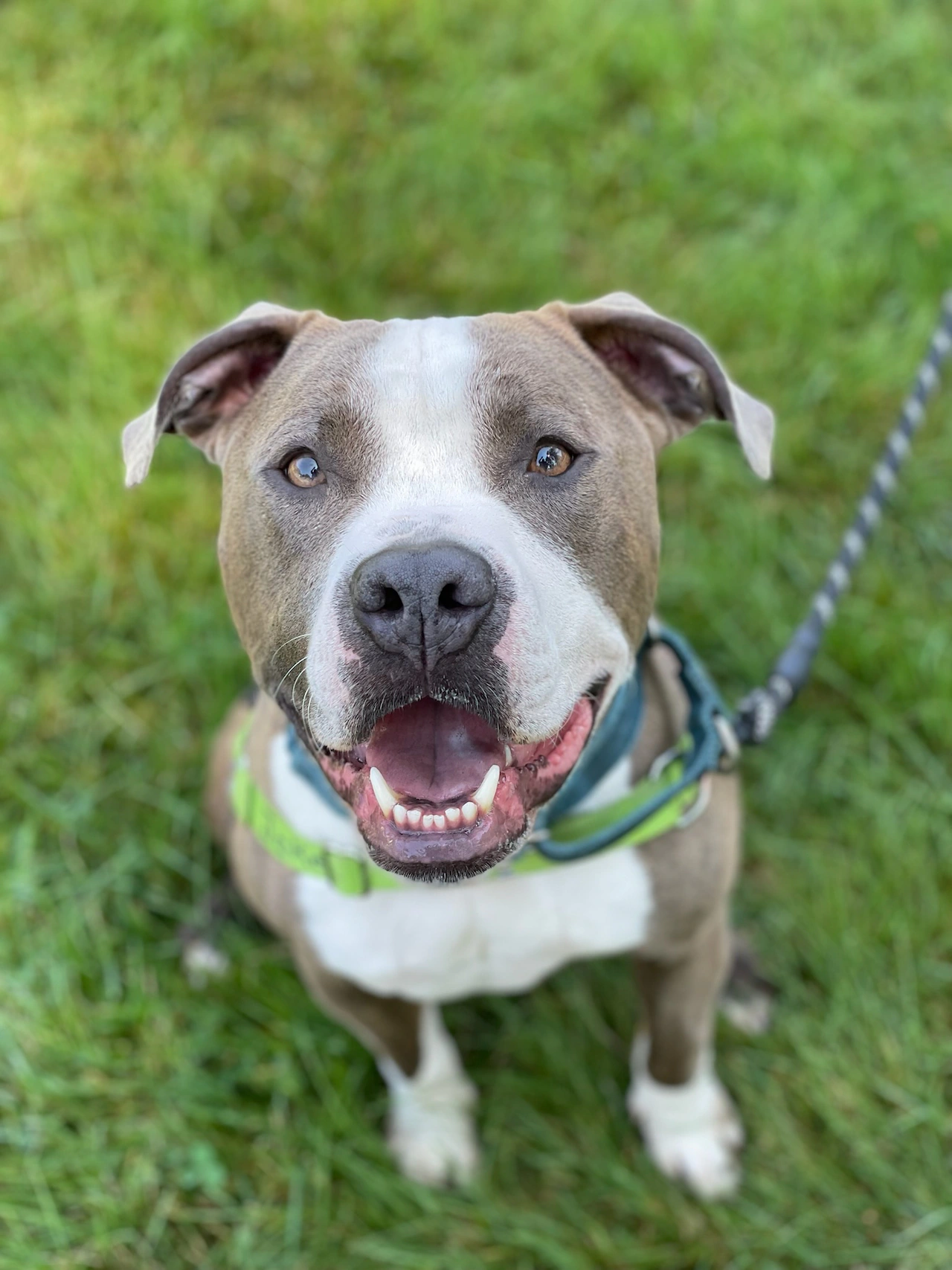
For more than two years, a beloved pit bull waited to find his forever family. Many at Worcester Animal Rescue League (WARL) fell in love with the dog named Joker and had hoped to do whatever it takes to find his new family.
But as a crisis hit the animal rescue, it became clear: The shelter could no longer house animals considered dangerous.
Joker was one of about a dozen dogs from WARL that were euthanized this year.
The pit bull, while loved by many staff and volunteers, had multiple incidents that showed he was a danger to the community, even if he could find a loving home, Mike Keiley, vice president of the animal protection division of MSPCA-Angell, told MassLive.
Each decision was “really painful,“ Keiley said. “Even though everyone could objectively understand that rehoming an animal wasn’t going to be successful … making a decision for euthanasia is always incredibly tough.”
MSPCA-Angell stepped in to assist and agreed to help WARL after the Massachusetts Department of Agricultural Resources (MDAR) conducted an inspection of WARL between December 2024 and January and almost gave it a cease-and-desist order.
One of the big issues was capacity and caring for the animals already in the shelter’s care. But the issue had started long before the inspection.
More than 150 animals were sent out of Worcester from at least November to April as the city’s only animal shelter refused new intakes due to reaching capacity, which created a growing crisis for the city’s Animal Control.
The police department had to find new places to put the 156 animals, including 105 dogs and 51 cats, during this time, Worcester police spokesperson Joseph Cersosimo told MassLive.
“I would say they’ve probably been at capacity for longer than [November], just because they’re really representing one of the only shelter systems in the Worcester area altogether,” Keiley said. “And Worcester is the second largest city in Massachusetts. There’s no doubt there’s incredible need.”
Pausing animal intake last year “was not easy, but it was necessary in order for us to reorganize in the hopes of creating a more sustainable and impactful future for both the animals in our care and the Worcester community,” WARL Board Chair Warner Fletcher said in the statement.
A ‘no-kill’ shelter
At one point, WARL was one of the largest no-kill shelters in the area.
Keiley hopes to get it back to that point — but it won’t be called a no-kill shelter anymore.
There isn’t a universally held definition for a no-kill animal shelter. However, that designation is often used to describe a shelter having a 90% placement rate or better.
“While the MSPCA-Angell placement rate is above 90%, we do not refer to ourselves as a no-kill shelter because we believe that term can be misleading when trying to understand the complex decisions a shelter or owner must make in regards to euthanasia,” the MSPCA said in a statement.
While capacity was an issue at WARL, none of the euthanasia decisions were based on that.
“We do not make euthanasia decisions based on breed, age, or time limits within our adoption centers,” MSPCA said.
Multiple times, Joker had gotten loose from the WARL staff and attacked other dogs “significantly to the point of great harm.”
“If they had been smaller dogs, he probably would have killed them,” Keiley said, adding that the dog also showed aggression towards children and people of color.
Plus, Keiley added, these attacks had happened in a controlled kennel environment. What would happen if it was out in the community?
“That’s a big responsibility that we can’t take lightly,” he said.
They also spoke with Best Friends Animal Society, a well-known no-kill advocate, about the decision to euthanize the dogs.
“They would stand behind it,” he said. “… because they agree that achieving no-kill is not holding on to animals longer, blocking opportunities for other animals that need to come into care. And it’s not housing animals that are unplaceable for long periods of time.”
But he knows it wasn’t easy, especially for those who had bonded with Joker over the years, which is why they offer mental health help to their employees.
Still, it had to be done, he said.
“I think anyone who believes that Joker should be placed and take those risks, I have a lot of questions about whether they’re thinking objectively there. Because two dogs were already harmed and do we want to accept a third,” he said. “And what happens if he made contact with a child?”
The other dogs had similar issues.
Keiley said it’s rare for a shelter to have this many dogs with the level of behavior issues that they are unsafe to rehome. But that’s because a decision to euthanize a dog would’ve usually been made long before the shelter accepted another.
Joker was in the shelter more than 50 times longer than the average dog, which is about two weeks. Other dogs at WARL were staying for an average of six months.
Going forward, WARL will be aiming to adopt a dog within two weeks of being deemed adoptable.
“What really has to be factored in and kept in the front of our minds is the longer an animal stays in the shelter, the more stressed they are, the more likely they are to be unsuccessful,” he said. “And in the worst case scenarios, you can start to see stereotypic behavior issues happening from over kenneling.”
Moving forward
While WARL was overwhelmed and in crisis, they were doing whatever they could to “help them get through the day,” Keiley said.
But he was able to help them step back and create a better long-term solution. This includes open adoption hours, a system for euthanasia decisions and facilitating adoption applications.
“Those tend to get a backseat when you’re in an overwhelmed state,” he said.
Earlier this month, WARL announced a new executive director, Aimee Contois. Previously, she was the animal control officer and animal health inspector in Auburn since 2015.
“I’m excited to move to the nonprofit sector where I believe my experience will benefit more animals, as well as the community in general, which is something that’s deeply personal to me as a Worcester native,” said Contois in a statement. “I’m really looking forward to joining the immensely dedicated team at WARL, helping rebuild our reputation and working together to make sure that we are the resource needed for people and animals in Worcester.”
In April, Kristin Mullin’s LinkedIn page stated she was the executive director and a recorded voicemail message to the executive director’s phone number still said her name. But the shelter confirmed with MassLive that she was no longer in that role after more than five years. As of Thursday, the LinkedIn page states she ended being the nonprofit’s executive director in January.
Kathy Jamieson was the interim executive director of the Worcester Animal Rescue League for the past few months.
In June, WARL said it was undergoing a “full transformation aimed at improving operations and outcomes for animals in need right here in Worcester.”
The shelter noted that as part of its “rebuilding,” a new contract between WARL and Worcester Animal Control will be made. The new contract is expected to “yield better outcomes for stray animals in Worcester, with clearly defined roles and responsibilities that will help prevent overcapacity in WARL’s kennels and maximize opportunities for reunification of stray animals with their owners.”
On June 23, walk-in adoptions were allowed back at WARL. And since then, WARL has posted success stories of recent adoptions, including a 12-year-old dog named Gemma.
“Gemma spent just 12 days with us. From intake to her freedom walk out the front door, it all happened so fast. It’s rare. It’s beautiful. It’s a testament to the power of sharing, caring, and believing that every dog deserves a second chance, no matter their age,” the Facebook post read. “We were flooded with messages and emails. People we’ve never met willing to open their hearts and homes to a dog they didn’t know. That kind of love … it leaves us speechless. All we can say is … Thank you.”
WARL previously told MassLive it was taking one step at a time.
Once stray animals were allowed to be accepted, WARL will also look to start accepting voluntary surrenders, Keiley said.
“We’re taking things slowly to ensure that everything runs smoothly and is sustainable, which is necessary for WARL to once again be the vital resource the community needs,” Keiley said in the statement.
Open hours at the shelter are Monday, Wednesday and Friday from 12 to 4 p.m.
As of Thursday afternoon, the shelter has three dogs available for adoption, two of which are in foster homes, and seven cats.



